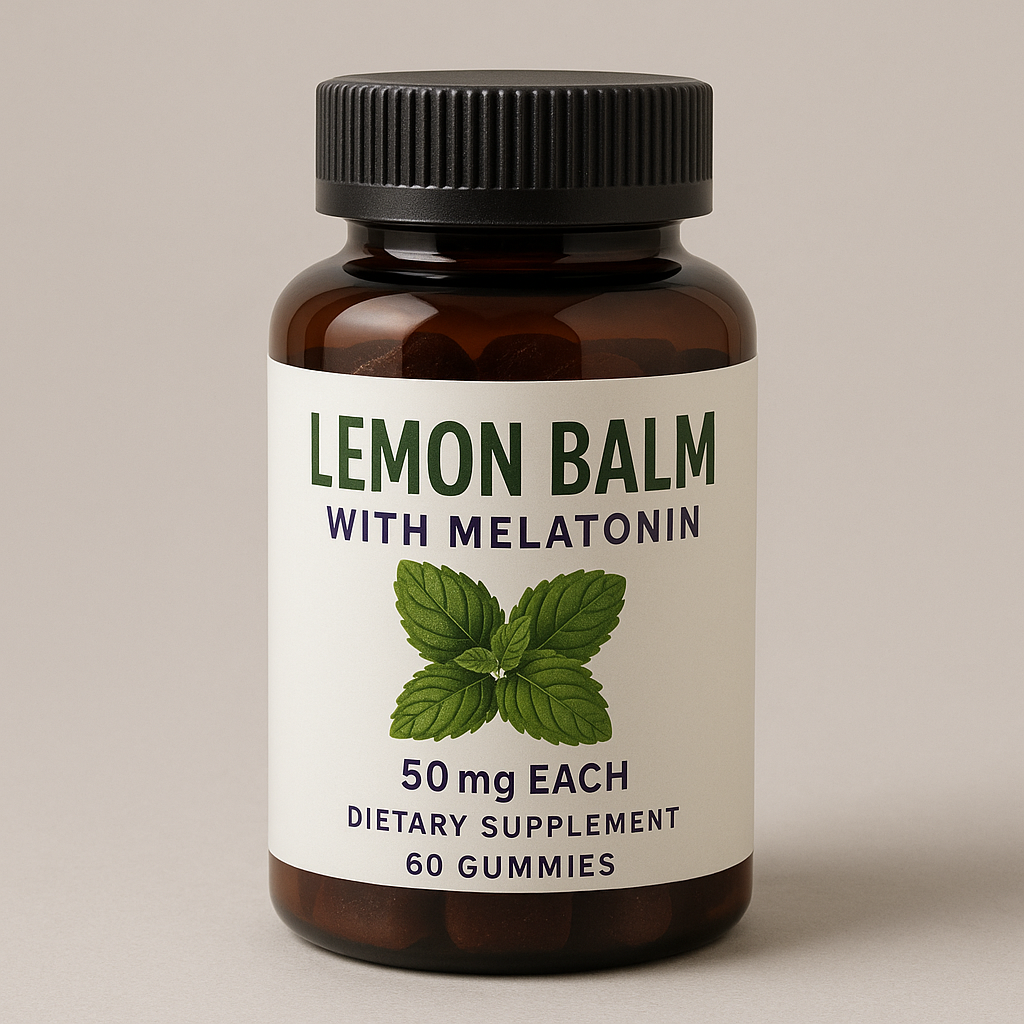A truly restful night’s sleep often feels like an elusive dream. The constant demands of modern life, combined with the pervasive presence of digital screens and viral content doom scrolling, can disrupt our natural sleep cycles, leaving us feeling perpetually tired. While countless sleep aids flood the market, many come with the baggage of side effects or the risk of dependency.
Among the most promising natural solutions is the synergistic combination of melatonin with lemon balm. This herbal blend provides a compelling alternative for those seeking a peaceful night’s sleep without unwanted compromises.
What is Melatonin?
Often hailed as the body’s natural sleep hormone, melatonin plays a major role in regulating our circadian rhythm – the internal 24-hour clock that dictates our sleep-wake cycle.
Produced by the pineal gland in the brain, melatonin levels naturally rise as darkness falls, signaling to the body that it’s time to wind down and prepare for sleep. Conversely, light exposure, particularly blue light from electronic devices, can suppress melatonin production, throwing our sleep patterns into disarray.
Supplementing with melatonin can be particularly beneficial for various sleep challenges. For instance, individuals experiencing jet lag or those working night shifts often find melatonin helpful in recalibrating their internal clocks.
Older adults, whose natural melatonin production tends to decline with age, can also experience improved sleep quality with supplementation. Melatonin doesn’t act as a sedative in the traditional sense, but rather helps to initiate and maintain a state of “quiet wakefulness” that naturally transitions into sleep. It aids in reducing the time it takes to fall asleep and can improve overall sleep quality, leading to a more refreshing wake-up.
While generally safe for short-term use, it’s important to note that higher doses aren’t necessarily more effective and can sometimes lead to grogginess the next day, a phenomenon often referred to as “melatonin hangover.” The goal with melatonin is not to force sleep, but to support the body’s natural inclination to rest.
The Calming Embrace of Lemon Balm
Beyond its delightful citrusy aroma, lemon balm (Melissa officinalis) is a revered herb with a long and rich history in traditional medicine, dating back to the Middle Ages.
A member of the mint family, this calming botanical has been cherished for centuries for its ability to soothe the nervous system, alleviate stress, and promote relaxation qualities directly conducive to restful sleep.

The benefits of lemon balm for sleep are due to its anxiolytic (anti-anxiety) properties. Lemon balm works by increasing the levels of gamma-aminobutyric acid (GABA) in the brain. GABA is a neurotransmitter that helps to block communication between hyperactive nerve cells, effectively slowing down certain brain functions associated with stress, anxiety, and fear. By promoting a sense of calm and reducing mental agitation, lemon balm creates an optimal environment for sleep to naturally occur.
Scientific studies have begun to validate these traditional uses, demonstrating lemon balm’s potential to:
- Help you fall asleep faster: By calming the mind, it can reduce the time it takes to drift off.
- Reduce sleep disturbances: Its soothing effects can contribute to more uninterrupted sleep.
- Boost sleep quality: A more relaxed state often translates to deeper, more restorative sleep.
- Improve mood and cognitive performance: Given its stress-relieving properties, it can indirectly enhance mental well-being and focus.
Lemon balm can be consumed in various forms, including teas, tinctures, and supplements. Drinking a cup of lemon balm tea about half an hour before bedtime is a popular method to harness its calming effects.
Why You Need Melatonin with Lemon Balm
While both melatonin and lemon balm offer distinct advantages for sleep, their combined use creates a powerful synergy that addresses multiple facets of sleep disturbance. Melatonin tackles the physiological timing of sleep, helping to regulate the body’s internal clock, while lemon balm addresses the mental and emotional factors that often impede sleep, such as stress and anxiety.
When you combine melatonin with lemon balm, you’re not just taking two separate sleep aids; you’re engaging a comprehensive approach to sleep support.
Melatonin helps signal to your body that it’s nighttime, encouraging the natural onset of sleep, while lemon balm ensures that your mind is calm and ready to receive that signal. This dual action is particularly effective for individuals whose sleep issues stem from a combination of circadian rhythm disruption and daily stress.
This lemon balm and melatonin supplement blend offers a holistic pathway to sleep, moving beyond simply inducing drowsiness to fostering a genuinely restful and rejuvenating experience. It’s an ideal choice for those seeking a gentle, non-habit-forming solution that supports the body’s natural sleep mechanisms.
Embracing Natural Sleep Aids: Broader Considerations
The appeal of natural sleep aid options like melatonin and lemon balm lies in their ability to work in harmony with the body, often with fewer side effects compared to pharmaceutical interventions. Beyond this potent duo, several other natural compounds and practices contribute to better sleep:
Other Beneficial Herbal Blends and Natural Compounds:
- Valerian Root: Another long-standing herbal sedative, valerian root is believed to increase GABA levels, promoting calmness and improved sleep quality. It’s often combined with lemon balm or hops.
- Chamomile: Widely known for its gentle calming properties, chamomile tea is a popular bedtime ritual. Its antioxidant apigenin interacts with brain receptors to induce drowsiness and relaxation.
- Lavender: The soothing fragrance of lavender essential oil, used in aromatherapy, can significantly improve sleep quality. Oral lavender supplements have also shown promise in reducing anxiety and promoting sleep.
- Passionflower: This herb has mild sedative properties and helps increase GABA, making it effective for restlessness, anxiety, and insomnia.
- Magnesium: An essential mineral involved in hundreds of bodily processes, magnesium helps quiet the mind and body. It plays a role in regulating melatonin production and relaxing muscles, and its deficiency can lead to troubled sleep.
- L-Theanine: Found primarily in green tea, this amino acid promotes a relaxed state without causing drowsiness, reducing stress and anxiety, which can indirectly improve sleep quality.
- Ashwagandha: An adaptogen used in Ayurvedic medicine, ashwagandha helps the body adapt to stress, making it easier to maintain homeostasis and promoting better sleep.
- Glycine: This amino acid can help regulate core body temperature during sleep, allowing for deeper and more restful slumber.
Optimizing Your Sleep Environment and Habits:
While natural supplements are powerful tools, they are most effective when integrated into a comprehensive sleep hygiene routine. Consider the following:
- Maintain a consistent sleep schedule: Go to bed and wake up at the same time each day, even on weekends, to reinforce your circadian rhythm.
- Create a conducive sleep environment: Ensure your bedroom is dark, cool, and quiet. Block out light, use earplugs if necessary, and keep the room temperature comfortable.
- Limit screen time before bed: The blue light emitted by phones, tablets, and computers can disrupt melatonin production. Aim to disconnect at least an hour before sleep.
- Avoid caffeine and heavy meals late in the day: Stimulants and large meals can interfere with your ability to fall and stay asleep.
- Incorporate relaxation techniques: Practices like deep breathing, meditation, gentle stretching, or a warm bath can signal to your body that it’s time to wind down.
- Engage in regular physical activity: Exercise can improve sleep quality, but avoid intense workouts close to bedtime.
The Future of Restful Nights
The journey to consistently good sleep is often a multifaceted one. For many, integrating a melatonin with lemon balm supplement represents a significant step towards achieving that elusive restful state. It offers a gentle yet effective way to support the body’s natural sleep processes, addressing both the hormonal and psychological factors that contribute to sleeplessness.
As research continues to show the intricate connections between natural compounds and our well-being, the role of herbal blends like the melatonin herbal blend with lemon balm will only grow. It empowers individuals to take control of their sleep health, opting for solutions that work in harmony with their bodies rather than against them.
If you’ve been searching for a natural sleep aid that aligns with your desire for holistic wellness, the combination of melatonin with lemon balm might just be the solution you’ve been looking for. Embrace the power of nature and reclaim the restorative sleep you deserve.






